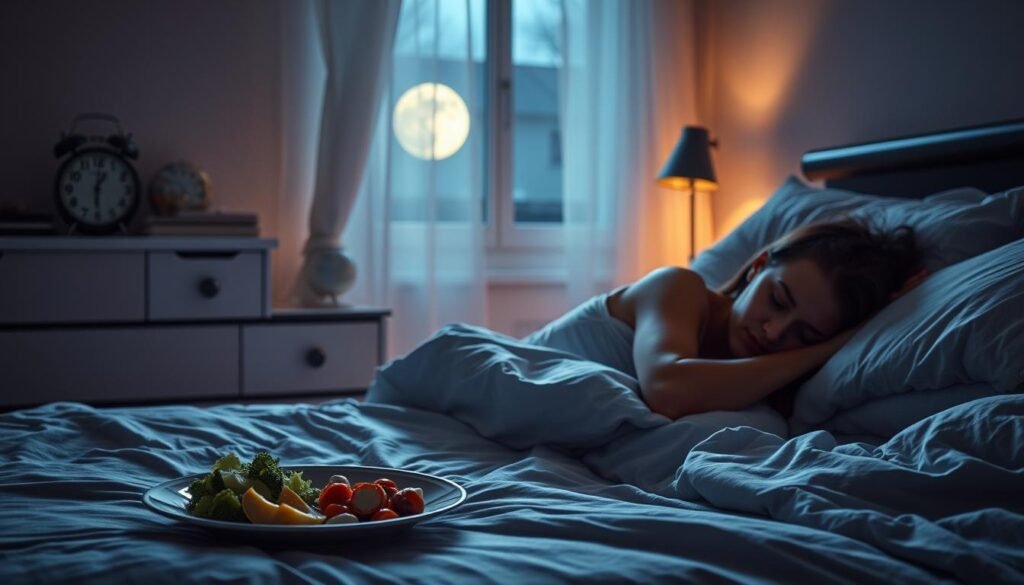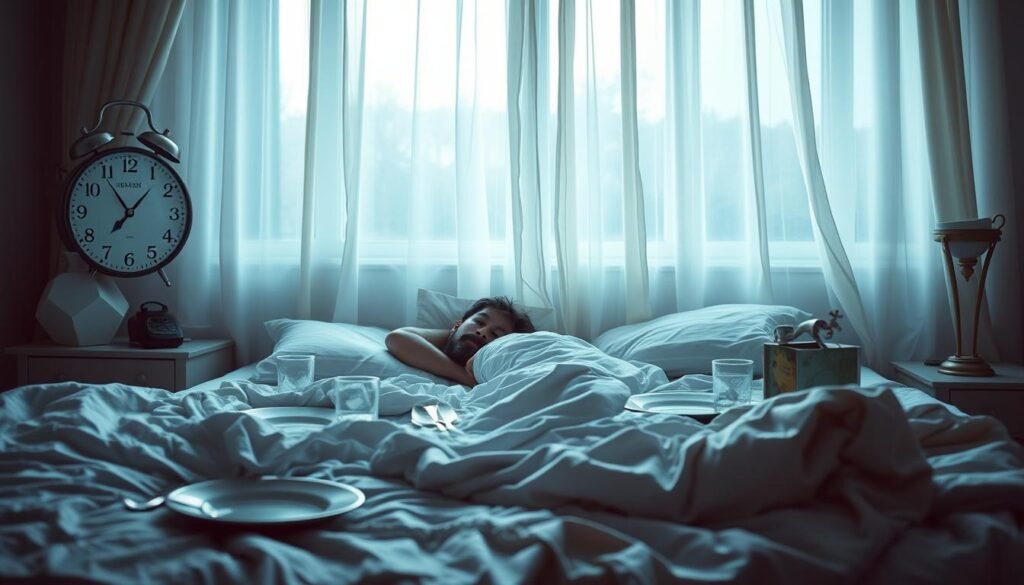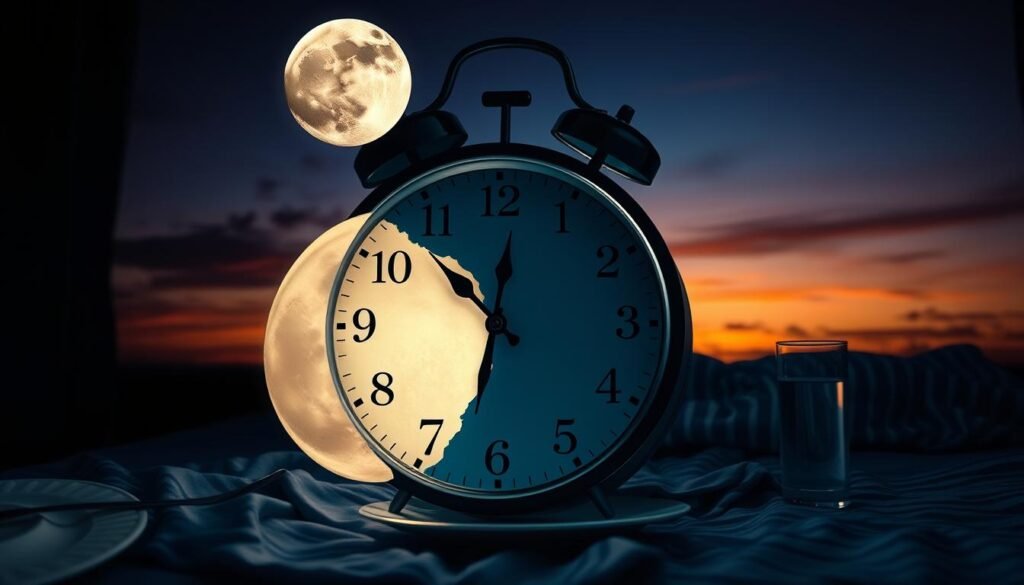Did you know that about 20% of people who fast experience changes in how they sleep? This is mostly during the early days of fasting. It shows how fasting affects sleep quality. As fasting becomes more popular, it’s key to know why insomnia happens. Fasting impacts sleep, making some feel tired but also full of energy. This guide will look into why fasting affects sleep and offer tips to sleep better.
Key Takeaways
- Fasting can significantly alter sleep patterns for many individuals, especially during the first days.
- Increased levels of orexin during fasting can lead to difficulties in falling and staying asleep.
- Circadian rhythms and hormones play a key role in regulating sleep quality while fasting.
- Individuals may report shorter perceived sleep durations but feel more rested upon waking.
- Structured daily routines and environmental adjustments can enhance sleep quality during fasting.
Understanding the Link Between Fasting and Sleep
Fasting has a big impact on how we sleep. Many people find it hard to fall asleep or stay asleep when they fast. This is because fasting can change our hormones and metabolism, which are important for good sleep.
In the US, eating late is common, usually after 6 p.m. This can mess with our natural sleep rhythms. Eating close to bedtime often leads to waking up at night and not sleeping well.
Many adults struggle with sleep, especially when fasting. Over 14% have trouble falling asleep, and 17% can’t stay asleep. Since one-third of adults don’t get enough sleep, we need to look at how fasting helps or hurts our sleep.
Using techniques like the 12-minute miracle could make sleep better. Managing stress and having a soothing routine before bed can help with fasting-related sleep issues.
To really get fasting and sleep, we must understand how our bodies react to hunger and sleep. Knowing this can help us make choices that are good for our health and wellbeing.
What Is Insomnia from Fasting?
Insomnia from fasting means you have trouble sleeping when you’re fasting. This issue comes from big changes in what you eat, feeling stressed, and body changes. These include inconsistent hunger signals and higher cortisol levels. People fasting for a long time often find their sleep isn’t as restful.
When you’re fasting your body might react to being hungry all the time. At the start, you could feel moody, anxious, and can’t focus well. These feelings make it hard to relax and fall asleep. Even though your body gets used to fasting eventually, the first part can mess up your sleep.
To really get why fasting affects sleep, we need to look at how diet impacts sleep quality. Your emotional state, blood sugar, and how you deal with eating less all matter. If you’re waking up a lot or not sleeping well while fasting, it might be time to check how you’re managing fasting and sleep.
Sleep Disturbances During Fasts: A Common Experience
Many people have trouble sleeping when they fast, like during Ramadan. They may find it hard to fall asleep or keep waking up. Insomnia becomes common, making it hard for many to get enough sleep during fasting.
About 20% of people say fasting changes their sleep. This might make them feel like their sleep quality is worse. But some feel more refreshed after sleeping less. This shows how fasting can affect sleep quality.
To improve sleep while fasting, try keeping a regular sleep schedule. Cut down on caffeine and avoid eating big meals late. Changes in your daily routine during fasting can also make sleep problems worse.
How Intermittent Fasting Affects Sleep Quality
Intermittent fasting can greatly affect how well you sleep. It influences your body’s daily rhythm, making your sleep-wake cycle more regular. This helps balance important sleep hormones like melatonin.
Effects of Circadian Rhythms on Sleep During Fasting
Keeping a regular fasting schedule helps your body’s daily clock stay on track. This clock controls sleep and many body functions. Eating at irregular times, especially during Ramadan, can mess up this clock. This can harm your sleep quality.
But, if you eat within set times, your body’s clocks work better together. This can lead to better sleep.
Impact of Hunger Cues on Sleep Patterns
When you fast, you might feel hungrier, and your body may release more cortisol. High cortisol can make you restless and make it hard to fall asleep. But, some may wake up less at night thanks to fasting. This could be due to better insulin handling and less inflammation. Drinking enough water while fasting can help keep hunger away. It also helps you stay sharp and in a good mood, which aids sleep.

| Type of Fasting | Benefits for Sleep | Considerations |
|---|---|---|
| 16:8 Plan | Enhances alignment with circadian rhythms, promotes regular sleep patterns. | Ensure hydration and limit food intake close to bedtime for optimal results. |
| 5:2 Plan | Improves metabolic health potentially leading to better sleep quality. | Careful meal planning required to prevent hunger at night. |
| Time-Restricted Eating | May reduce disruptive leg movements during sleep. | Caffeine intake should be monitored, especially in the evening. |
Adding mindfulness to intermittent fasting can also improve sleep quality. Eating enough protein and fiber helps you feel full. This makes falling asleep easier.
For more on how intermittent fasting impacts sleep, check out the detailed discussions on intermittent fasting and.
Hormonal Changes and Their Effect on Sleep During Fasts
Fasting triggers big changes in our hormones that affect sleep. Levels of cortisol, ghrelin, and leptin change, messing up our normal sleep cycles. High cortisol comes from stress, making it hard to fall and stay asleep. Studies show that not sleeping enough can lead to gaining weight because of hormone imbalance. These imbalances make us feel hungrier.
When fasting, we feel hungrier because of more ghrelin. At the same time, leptin levels drop. This mix makes sleeping well hard. The right balance of these hormones is key to controlling hunger and energy, which affects sleep quality.
Being awake too long affects the release of hormones like growth hormone and cortisol. This can mess up sleep further. Slow wave activity (SWA) is crucial for deep sleep but can be harmed when these hormones are off balance. This shows the strong link between hormone changes and sleep problems.
| Hormone | Effect on Sleep | Impact During Fasting |
|---|---|---|
| Cortisol | Increased stress can disrupt sleep | Elevated levels can affect sleep patterns |
| Ghrelin | Stimulates appetite, may hinder sleep | Higher levels lead to increased hunger |
| Leptin | Regulates energy balance, promotes sleep | Lower levels may disrupt sleep quality |
| Growth Hormone | Facilitates restorative sleep | Release influenced by sleep duration |
Knowing how hormonal changes during fasts affect sleep helps us find ways to fight fasting-related insomnia. The connection between hormones and sleep shows how complex our body’s reaction to fasting is. It underlines the need for a balanced lifestyle.
Why Some People Experience Sleep Deprivation While Fasting
Several factors cause sleep issues during fasting. People might feel more anxious and unable to rest, especially if they fast for a long time. This focus on hunger can make it hard to sleep well.
Without food, our bodies focus more on hunger signals. This can disturb our sleep. A bad sleep cycle can start: poor sleep leads to more stress and hunger issues, harming our sleep even more.
Research shows intermittent fasting affects sleep differently for everyone. Signs of sleep trouble from fasting include:
- Difficulty falling asleep
- Frequent awakenings throughout the night
- Heightened food cravings leading to restless nights
Eating a few hours before bed can help. This lets your body process the food and might ease fasting-related sleep issues. Eating healthily when not fasting, like a Mediterranean diet, also improves sleep.
The link between hunger, stress, and sleep needs careful balance. For tips on managing insomnia, check out this guide on improving sleep hygiene.

Nighttime Awakenings During Fasts: Causes and Solutions
Many people find nighttime awakenings challenging during fasts. These awakenings are often due to increased stress hormones and hunger signals. Being emotionally unsettled by fasting can also make you restless at night. To improve sleep quality, it’s important to find ways to address these problems.
Managing Stress Hormones at Night
Controlling stress hormones is key to fewer wake-ups at night while fasting. Several methods can help create a peaceful sleeping setting:
- Practice relaxation techniques such as deep breathing or meditation before bedtime.
- Maintain a balanced diet to stabilize mood and energy levels during fasting.
- Create a conducive sleep environment by ensuring darkness and minimizing noise.
- Avoid screens and stimulating activities leading up to bedtime.
- Limit caffeine and sugar intake, particularly close to bedtime, to prevent disruptions.
A study shows the big role of diet in sleep quality. Emotional eating behaviors greatly disrupt sleep. Developing a calming bedtime ritual helps alleviate insomnia-related anxiety, reducing night wakefulness during fasts.
Creating a peaceful sleep setting improves sleep hygiene. These changes do more than reduce nighttime awakenings during fasts. They also boost metabolic health, which is vital for fasting individuals.
Circadian Misalignment from Fasting and Its Implications
Fasting can throw off our body’s natural sleep-wake clock. This happens when we eat at irregular times, which is common with various fasting methods. This mismatch can lead to trouble getting good sleep.
Lots of adults don’t sleep enough, with many getting less than seven hours a night. This lack of sleep is more than just feeling tired. Studies show sleeping less increases obesity risk by 38%. Plus, misaligned sleep patterns can make us eat more, which might lead to weight gain.
Night-shift workers often face the negative effects of this misalignment. They struggle with sleep, feel more stressed, and are at higher risk for depression. Working at night makes it hard to keep a healthy lifestyle and manage weight.

Experts recommend eating meals in sync with our body’s clock to avoid these issues. Eating from 8 a.m. to 6 p.m. can help stay healthy and control hunger. Night-shift workers need to adjust meal times based on their schedules. Ongoing research is looking into how fasting affects sleep, health, and mood.
For more information, check out this article. It explores the connection between disrupted sleep, insomnia, and health risks.
Improving Sleep Quality While Fasting
Creating a solid routine can make a big difference in sleeping better during a fast. It’s essential to keep a steady schedule for eating and sleeping. This habit helps your body’s natural rhythms and balances hormones that impact sleep.
Creating a Structured Daily Routine
Having a set schedule highlights the role of when to eat and when to sleep. Eating and sleeping at regular times keeps your body’s clock in sync. But, eating too much or too late can disrupt sleep, making you restless at night. Research shows that sticking to a fasting routine with consistent meal and sleep times can improve sleep quickly, often within a week.
It’s crucial to avoid heavy meals before bed to let your body digest. A right fasting schedule helps avoid waking up too early. This leads to deeper, more restful sleep.
The Role of Physical Activity in Enhancing Sleep
Adding exercise to your day can also help you sleep better while fasting. Exercise relieves stress and lifts your mood, leading to better sleep. But, timing matters. Intense workouts before bed can keep you awake. Instead, try gentle activities like yoga or stretching in the evening to unwind and get ready for sleep.
In summary, keeping a regular routine and staying active can greatly benefit those fasting. These steps create a setting that promotes improved sleep and health.
Conclusion
Many people find fasting hard because it can mess with their sleep. This trouble comes from changes in hormones, stress, and your body’s internal clock. Even though fasting can make some people’s sleep better, others might struggle a lot.
Studies show that intermittent fasting can actually make sleep better. On average, people see a 9.6-point improvement. Sticking to a regular fasting schedule can help sort out sleeping problems. A study with 99 people found that 77.2% could keep up with their fasting most days.
These findings show it’s key to find personal ways to sleep better while fasting. If you adjust your fasting and make some lifestyle changes, you can deal with sleeping issues. This lets you enjoy the benefits of dietary changes too.